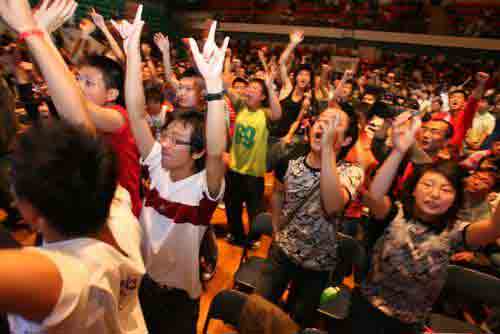
Chinese rock music enthusiasts should never forget May 9, 1986.
On that very evening, a concert in Beijing commemorating the Year of World Peace opened a new page for China's pop music.
Besides the unprecedented scale of participation of 128 ace singers, this concert witnessed the birth of China's homegrown rock music. During the concert, Cui Jian, known as the godfather of Chinese rock music, in peasant clothing sporting uneven length trouser legs, hopped onto the stage and blurted out "I once kept on asking again and again, 'When would you go with me?" That was from his song Nothing to My Name. Off stage there was dead silence initially, but when the song was over, the amazed crowd burst into hoorays and applause.
Cui's shouts awakened any remaining deaf ears to rock music in China. The words "rock music" lodged deep in people's hearts overnight. Before long, young people all over China were banging out Cui tunes on beat-up guitars in campus dormitories across the mainland.
The pulsating 1980s witnessed the establishment of Cui Jian and other big-name bands like Tang Dynasty, Cobra, and the Panthers, with more rockers swarming into the camp.
Rock music was destined to brand itself with Chinese characteristics since its first import into China. Popular rock bands skillfully integrate Chinese music instruments like bamboo flutes, gongs, zithers and Chinese mandolins. Folk art like Xiangsheng (comic dialogue) and Er'renzhuan (a song-and-dance duet originating in Northeast China), or even Chinese operas have been known to crop up in rock amid electronic guitars, drums, and bass. Rock songs boasting the essence of Chinese values also abound.
However, since the end of the 1990s, rock music in Chinese mainland has been severely threatened by commercially run pop music from Hong Kong and Taiwan.
In the struggle between the ideal of independent art and the reality of the commercial world, many rockers chose to submit to the real world, or at least tried to find a balance between the two. They are seen by insiders as traitors to the spirit of independent rock.
Meanwhile, hardcore rock youth hastily dove underground to pursue artistic independence. Among them were distinctively different groups of cynical punks, obscure metal fans, and dark music lovers. But this separates rock music even further from the masses and mainstream ideology.
For a long time, Chinese rock music has been struggling to step out of its tiny self and serve a wider audience by achieving a balance between commercialism and art.In recent years, China's rock music scene has exhibited more buoyancy.
In 2004, over 10,000 young rock fans from the across the country headed to the Helanshan Mountain in Northwest China's Ningxia Hui Autonomous Region for a rock festival, where 18 rock bands played over three nights in the desert. The profit of 1 million yuan made the festival the most successful commercial festival in China's rock history.
In May 2006, the Midi Music Festival, an annual rock music pageant since 2000, made Beijing's Haidian Park a rock paradise hosting 45 rock bands-31 Chinese bands and 14 foreign bands-and over 30,000 rock enthusiasts of different nationalities.
Although the past two decades is only a very short period in China's history, these years contain an overwhelming amount of passion, joy and struggle. Rock music, a young and volatile import to China in the 1980s, subtly reflects the society's changes in a unique way.
Highlights of Rock Music in China
- 1987: Smash-hit rock album. Following the phenomenal success of the stage debut of Cui Jian's best known and most beloved song Nothing to My Name, he released his first real album in 1987, the first rock music album in China, Rock'N'Roll On The New Long March, which includes the first recording of Nothing To My Name.
- 1990: Modern music concert. In February 1990, a modern music concert, known as the first Chinese rock music festival, was held in Beijing's Capital Stadium. Six major rock bands including Tang Dynasty, Breathe, Cobra, the Baby Brothers, 1989, and ADO participated. The concert was a milestone, ushering in a thriving era for Chinese rock music. Beijing, as a base for new music forms, witnessed the first collective debut of Chinese rock talents.
- 1992: China Fire album. China Fire, the first influential Chinese rock music album, was released in 1992. The album was a compilation of the best contemporary artists and producers in Chinese rock circles. Even in an age when hip-hop music prevails, people are still amazed by the album's high artistic and commercial standards.
- 1994: Hong Kong Coliseum Concert. On December 17, 1994, the three "rock wizards" - Dou Wei, Zhang Chu and He Yong - and the Tang Dynasty from mainland staged their Chinese rock music at the Hong Kong Coliseum. No other concert in Hong Kong had been as crazy. The three-and-a-half hour show, with its contagious passion, turned out to be a great hit, demonstrating the tenacious, hidden vigor and vitality of rock music from the Chinese mainland. The groups brought the Chinese rock scene to a new high in the post-Cui Jian era.
| 